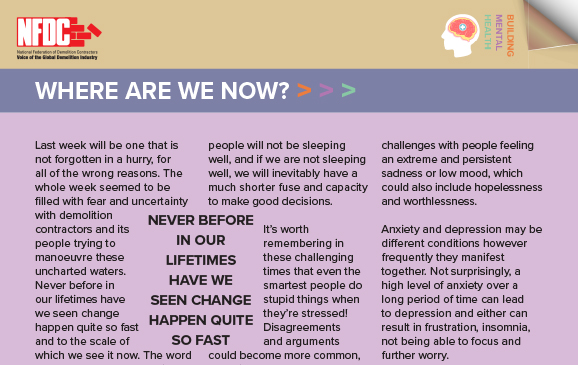Covid-19: Mental Health and wellbeing – Where are we now?
Last week will be one that is not forgotten in a hurry, for all of the wrong reasons. The whole week seemed to be filled with fear and uncertainty with demolition contractors and its people trying to manoeuvre these uncharted waters. Never before in our lifetimes have we seen change happen quite so fast and to the scale of which we see it now. The word unprecedented was applied to everything; even a trip to the shops to buy essentials quickly became tantamount to running the gauntlet. Adrenaline was pumping and energy high wherever we looked.
But as the weekend progressed and the realities of our new lives took hold that adrenaline leaves us feeling lethargic with our energy depleted.
There’s been a lot of discussion in the trade press and across the wider industry about whether we should or shouldn’t be at work, I’m not going to get into the politics of that, but it’s safe to say that either way everyone has now entered a period of uncertainty.
It is likely that due to the over production of stress hormones, people will not be sleeping well, and if we are not sleeping well, we will inevitably have a much shorter fuse and capacity to make good decisions.
It’s worth remembering in these challenging times that even the smartest people do stupid things when they’re stressed! Disagreements and arguments could become more common, financial troubles may start hitting home and quickly we could find ourselves in a perpetual cycle of increased and prolonged anxiety, with no end in sight.
Anxiety and depression are two of the common mental health problems that perhaps spring to mind when we are chatting about mental health and while these are two different medical conditions their symptoms and causes can overlap.
Anxiety for example, a normal response we all have to stress or danger, is sense of unease such as worry or concern. However, difficulties arise when the response is out of proportion to the actual danger of the situation. Depression on the other hand, is generally a typical response to loss or life challenges with people feeling an extreme and persistent sadness or low mood, which could also include hopelessness and worthlessness.
Anxiety and depression may be different conditions however frequently they manifest together. Not surprisingly, a high level of anxiety over a long period of time can lead to depression and either can result in frustration, insomnia, not being able to focus and further worry.
Once a person is depressed there is a bigger problem to solve and this is a clinical dis-ease much harder to cure. This is why, last week, I wrote about six things that we can all do dial down that daily anxiety, enabling us to recharge our batteries which will make us more resilient to further challenges down the road.
- Maintain physical distance but not social isolation
- Limit news consumption
- Create a new routine
- Stop obsessing and focus on what you can control rather than what you can’t control
- Stay active
- Seek help when you need it
Right now, when human contact is lacking, we need to make the effort to connect, check in on people you haven’t heard from for a while, a friend or neighbour as this can also make us feel like we have a purpose.
If you are not ready to start with a bigger routine or plan then don’t worry, this is not a ‘to do’ list and there is no guilt attached. Cut yourself some slack. You, along with the rest of the population, have never experienced this before.
So, if you can do nothing else because they just feel too big then there is a quick technique the NFDC has been sharing throughout the mental health and wellbeing campaign that is now more important than ever. This technique is science-based and scientifically validated and is an effective technique to ‘take the charge’ out of a stress reaction and start the shift into a more resilient state.
What’s more, it’s designed to be used eyes open, in the moment and without anyone else knowing you are using it – we have to breathe anyway so in these times of uncertainty, overwhelm and stress we might as well make it effective!
- Focus your attention on your chest
- Imagine your breath is flowing in and out of your chest/heart breathing a little slower and deeper than usual
- Inhale for 5 seconds
- Exhale for 5 seconds
- Repeat until you feel a little better
Remember, it’s OK not to be OK, if you are finding things overwhelming, then it is important to ask for help. The Construction Industry Helpline provides a safe place for people to contact should you need additional help large or small and you can call the Construction Industry Helpline (24/7) on 0345 605 1956.
Alternatively, contact a mental health charity such as Anxiety UK, Mind or Rethink Mental illness or call the Samaritans (24/7) on 116 123.
To help support as many people as possible, during the Coronavirus pandemic Anxiety UK have announced that they will be extending their helpline hours in the evenings until 10pm and over the weekend between 10am – 8pm, you can speak to someone at Anxiety UK on 03444 775774.
So, during these extraordinary times remember to ‘be kind to yourself, you have never experienced anything like this before’.
Dave Price
Managing Director
Vector Equilibrium Ltd
